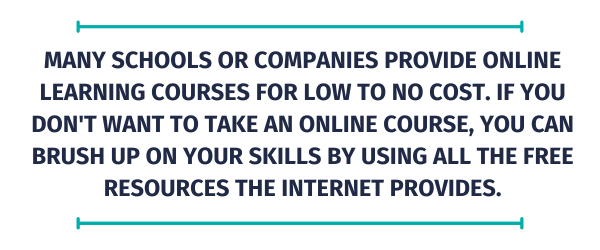Empower Your Future: Invest In Yourself and Unlock Financial Freedom
01/16/2025
By: Conor Moreau

Life is full of little choices, of daily decisions that shape who we are and how we live our lives. When a new year starts, people often make lists of grandiose changes they'll make. Writing a checklist is easy, but it's much harder to abide by it.
The choice to change can't spawn from a mere desire; it flourishes through commitment.
It only takes about three weeks of consistency for you to form a new habit. Hate how much time you spend on your phone? Put it aside for three weeks and replace it with reading, walking, or listening to music. Want to exercise more? Try to make the commitment to do something, anything, once a day for three weeks and see how often it becomes second nature. You don't need a resolution to inspire change; you need a general NEED and commitment to follow through and develop the routine.
But what about making financial changes?
The basic idea remains the same: consistency and routine can help you make positive changes to your financial standing.

Budget Breakdown
Want to adjust how you live your life but feel like you don't have the funds to achieve it? Maybe it's time for a budget refresh.
It's so much simpler than you think; all you have to do is:
- Review your spending habits. Know where your money is going each month, your spending patterns, and recurring expenses.
- Identify areas for improvement. Determine areas where you can cut back or make smarter financial decisions. Trim what you no longer need or use.
- Define your goals. Set short-term and long-term goals for yourself, make them manageable, and set yourself up for success.
- Build your budget.
The area with the most room for variance is when it comes to building your budget; it's important to find a system that not only works for you but that you'll actually consistently stick with.

Here are some methods to consider:
- The 50/30/20 Rule: Your budget is precisely portioned between three categories: 50% of your income is allocated to your needs, 30% to wants, and 20% to savings or debt repayment. You can adjust the proportions as needed to better suit your unique needs and goals.
- Zero-Based Budgeting: A role is assigned to every single dollar earned so that you are left with $0 unaccounted for once you've finished making your budget. Your income minus your expenses should equal $0. The level of planning required for this method gives you a clear view of your money and ensures a plan for every dollar.
- Envelope System: This budgeting system requires you to divide your money between spending categories to help you visualize and track your habits. We outlined the process and how to modernize it in our recent blog: Give This Simple Budget Hack a Try Now!

INVEST IN YOURSELF
The best thing you can do for your future is to invest in yourself; it can open up new career avenues, improve your day-to-day life, and provide education to help you flourish.
- Consider pursuing a degree in your chosen or desired field of employment or obtaining a higher degree. You could work toward your Associate's, Bachelor's, Master's, or even a Doctoral degree if it would be beneficial for your field.
- If you know there's a particular area of knowledge you would like to expand, see if any of the local colleges in your area offer classes or programs focused on those areas. Most schools allow you to attend specific courses without pursuing a full degree.
- Obtain certifications that bolster your resume or help enhance your skillset at work.
- Many schools or companies provide online learning courses for low to no cost. If you don't want to take an online course, you can brush up on your skills by using all the free resources the internet provides.
- Seek out podcasts, videos, books, industry publications, and blogs. Many may be available at minimal or no cost to you!
- If there are other positions within your department you're interested in pursuing in the future, ask your boss if you can begin cross-training in some aspects of that position. This early introduction lets you familiarize yourself with the role and determine if the position interests you long-term.
You don't need to spend money to invest in yourself, but it does require time. If it's important to you, set time aside each week to improve your skills or further your education.

LET'S RAISE THAT SCORE
If you have bigger goals this year but feel like you can't make them a reality just yet, focus on what you can improve - like your credit score. Here are a few simple tips you can follow to work on raising your score:
- Never Miss a Payment. It sounds obvious, but making sure that your payment history remains as spotless as possible can drastically improve your overall scores – and chances of securing a loan. Setting up automatic loan payments can help make sure you never miss a payment due date again!
- Reduce your debt. If you're struggling to pay down credit cards or lingering loans – consider applying for debt consolidation. Not only will it help your credit score, but it will also provide you with a convenient single monthly payment, so you don't have to keep track of multiple credit cards or loans.
- Wait. Payment history holds a great deal of weight, and if you continue to never miss a payment and show that you can handle and pay off the debt loaned to you, you'll naturally improve your credit score.
- Regularly check your score and credit report. Don't become obsessive, but keep track of your score. Try to check it once a month with SavvyMoney in our Digital Banking app so you can see what's been positively and negatively impacting your score, and you can adjust accordingly.
- Avoid taking on new debt. If you're working toward your goal, try to avoid adding new debt to your finances – debt is good, but too much debt can leave your score wounded and make it harder for you to secure a new card, loan, or whatever your goal might be.
Want to learn more about your credit score and how you can improve? Check out our recent blog: Easy Ways to Avoid Bumps in Your Credit Journey.
We're Here to Help!
No matter what your goals are, we're here to help. Build a budget that works for you, look into new ways to invest in yourself, and try to find little things you can commit to; they add up! Don't hesitate to take advantage of the many tools and resources available to you as a member of Atlantic. We're here to support you every step of the way!
If you'd like to learn more about how the credit union can help you maximize your savings this year or the ways we can help you achieve other goals, we're happy to help. Please stop by any of our convenient branch locations or call 800-834-0432 to speak with a team member today.
Stay up to date and join our email list.
The Atlantic blog strives to deliver informative, relevant, and sometimes fun financial information. If you enjoyed this article, please forward it to a friend.
Each individual’s financial situation is unique and readers are encouraged to contact the Credit Union when seeking financial advice on the products and services discussed. This article is for educational purposes only; the authors assume no legal responsibility for the completeness or accuracy of the contents.

